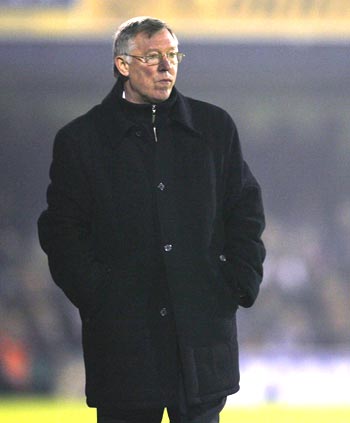Manchester United manager Alex Ferguson has endorsed UEFA's decision to ban Arsenal striker Eduardo da Silva for deceiving a referee.
"It was a high profile game and something has to be done," Ferguson said when referring to the ban after a UEFA-organised meeting of some of Europe's top club coaches.
"(In a big game) it creates an incredible reaction from the media and public in these instances," he said.
"Something should be done and we hope the message gets across."
Ferguson's comments came three days after Eduardo was judged by UEFA to have deceived the referee when he won a penalty during a 3-1 Champions League playoff win over Celtic. The Brazilian-born Croatia striker was banned for two games.
 But Ferguson added: "I would not criticise one of my own players publicly. When you make public criticism of your players, you damage morale. Your job is to keep it (the dressing-room) solid."
But Ferguson added: "I would not criticise one of my own players publicly. When you make public criticism of your players, you damage morale. Your job is to keep it (the dressing-room) solid."
He also sympathised with his long-term Premier League rival, Arsenal manager Arsene Wenger, who complained Eduardo had been singled out, and said high-profile games should be targeted.
"Arsene's point of view is a good one which is 'Where do we stop'?" said Ferguson.
Wenger confirmed Arsenal had appealed against Eduardo's ban but was reluctant to say any more about the incident.
"It's best not to say too much," he said.
"Everyone I have talked to at the club believes that it's in our best interests to keep quiet and try to get justice done."
Ferguson said diving was a major worry among leading coaches and talking to players was the key to eradicating the problem.
"I don't think any coach is proud of it when players simulate to get decisions," he added.
"A coach can't be proud if his team has won that way.
"Nobody can be proud. A player can't be proud one hour afterwards when he sits with his brothers and sisters and father and mother. You have to remember five-year-olds are watching," said Ferguson.
"Players in a Sunday team do it. It happens at five or six years old. We all have a responsibility on how it influences young people.
"It's a very difficult area because I think in the last 15 years it has crept into the game and it is not acceptable.
"I think we have to combat this by educating the players and by getting them to understand the gravity of the offence and what it does for the well being of the game.
"We all agree that education is the best way forward, from the youth team to the first team players."








